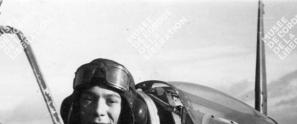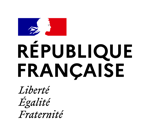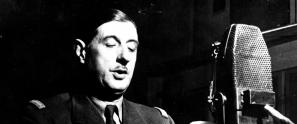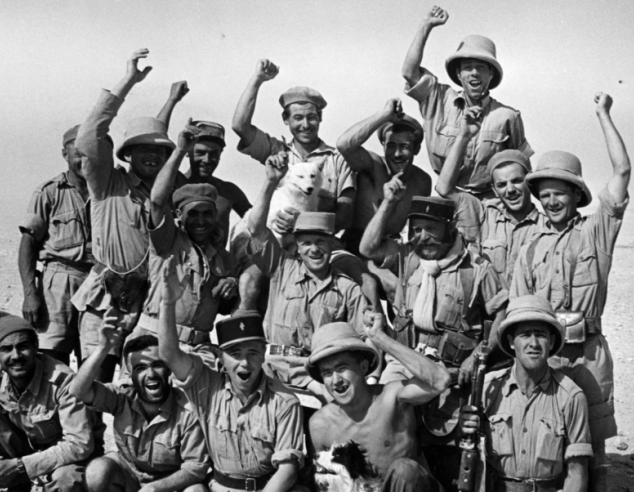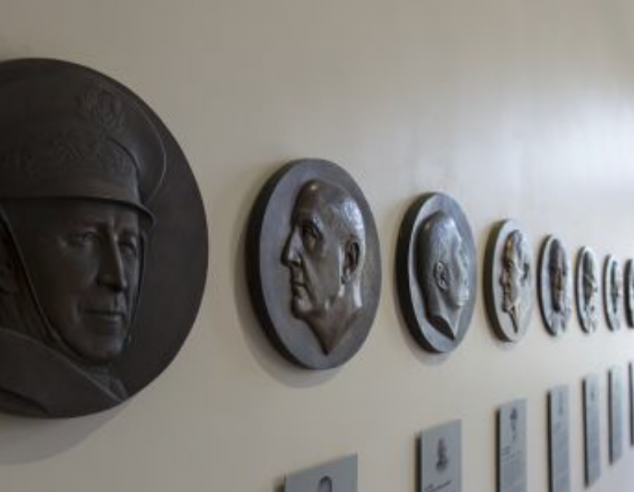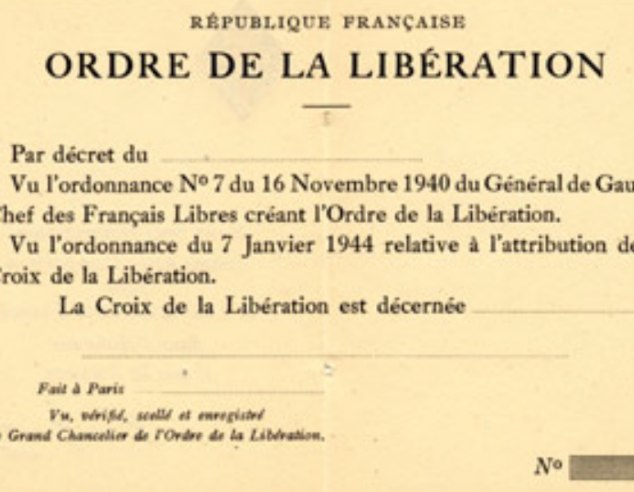The grand master and chancellors
General de Gaulle, founder of the Order of Liberation, was its only grand master. Following his death on 9 November 1970, the Council of the Order of Liberation decided there would be no successor. When it was first established, a chancellor was appointed to run the institution.
Charles de Gaulle
Charles de Gaulle was born in Lille on 22 November 1890 into a patriotic Catholic family. On graduating from Saint-Cyr Military School in 1912, he chose the infantry, which he deemed to be “more military”. During World War I, he was wounded and taken prisoner in 1916. After several escape attempts, he was incarcerated in the fortress of Ingolstadt.
During the interwar period, he contemplated a reform of the army. In his book, Vers l'Armée de Métier (“Towards a Professional Army”), published in 1934, he advocated the use of an armoured corps.
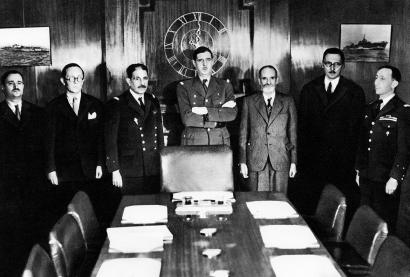 London, Carlton Gardens, 31 October 1941. French national committee. Minute of silence in Carlton Gardens as a tribute to those executed by firing squad in Nantes. From left to right: Mr Dejean, André Diethelm, Emile Muselier, General de Gaulle, René Cassin, René Pleven and Martial Valin.
London, Carlton Gardens, 31 October 1941. French national committee. Minute of silence in Carlton Gardens as a tribute to those executed by firing squad in Nantes. From left to right: Mr Dejean, André Diethelm, Emile Muselier, General de Gaulle, René Cassin, René Pleven and Martial Valin.
A Colonel in 1937 and temporarily a general in late May 1940, de Gaulle was appointed Undersecretary of State for National Defence and War by Paul Reynaud, President of the Council, on 5 June. On 16 June, on his return from an assignment in England, he learned of the request for armistice. He set out again immediately for London in the hopes of continuing the war, making an appeal to resistance on 18 June on BBC radio.
Thanks to his determination and Churchill's backing, he organised armed forces, which would later become the Free French Forces, and with the help of René Cassin created a French national committee, which would go on the become the French Committee of National Liberation on 3 June 1943, then the Provisional Government of the French Republic one year later. During these war years, he gradually rallied the Empire's territories, achieved union with the Internal Resistance and Jean Moulin, and made France one of the victorious states, alongside the Allies, Great Britain, the United States and the Soviet Union. Disagreeing with the constituent assembly about their approach to the state, de Gaulle resigned as President of the Provisional Government on 20 January 1946.
In a speech in Bayeux on 16 June 1946, he revealed a sound constitutional plan with a strong executive, sowing the seeds of what would become the Constitution of the Fifth Republic. On 14 April 1947, he launched a movement – the “Rassemblement du Peuple français” (Rally of the French People, or RPF) – which, while initially hugely successful in the municipal elections, did not achieve the desired impact in the 1951 legislative elections. But the RPF trained and mobilised activists, creating a framework that would prove important in 1958.
The impotence of the Fourth Republic over the Algerian issue led many politicians from across the board to solicit the General's return. Following the crisis of 13 May 1958 in Algiers, the President of the Republic, René Coty, decided to appeal to “the most illustrious of Frenchmen”. On 1 June, Charles de Gaulle then became the last President of the Council of the Fourth Republic. He was given full authority and had a Constitution drawn up that was adopted by referendum on 28 September 1958 with 79.2% “yes” votes. The Empire's various territories also passed it, except for Guinea, which thus became the first African state to obtain its independence. On 21 December that year, de Gaulle was elected President of the French Republic and of the African and Malagasy Community by an electoral college.
The most urgent task involved Algeria. De Gaulle made many trips there and moved towards the solution of independence: after his “peace of the brave” offer in October 1958, the following year he proposed self-determination for Algerians. The Generals’ putsch on 22 April 1961 was unsuccessful and failed to prevent negotiations being entered into with the FLN. The Evian Accords, signed on 22 March 1962 and accepted by referendum in France and Algeria, granted the latter independence.
1962 marked a key turning point. Released from the Algerian War but not the aftermath (repatriation of French citizens, OAS attacks), France's head of state sought to pursue a policy of national independence, thus reinforcing France's position.
In keeping with the Fourth Republic's nuclear policy, the first French atomic bomb detonated in Reggane in February 1960. Refusing to accept dependence on the United States, de Gaulle gradually withdrew France from NATO's integrated system (this would be complete in 1966), while remaining a member of the Atlantic Alliance. In a bid to build a truly European Europe, he brought about a rapprochement with federal Germany by signing the Elysée Treaty (22 January 1963) and rejecting Great Britain's inclusion in the European Economic Community, as it was too closely tied to the United States. He strengthened the EEC with the Common Agricultural Policy in 1963.
Pursuing a “free-hands” policy also meant reinforcing France's global presence in the eyes of the states created out of the former African and Malagasy Community, which had been independent since 1960, but also throughout Asia and Latin America. In 1964, de Gaulle acknowledged the People's Republic of China. He made an extensive visit of Latin American countries. He delivered a speech in Phnom Penh in 1966 in which he stigmatised the United States’ policy in Vietnam. In July 1967, the “Vive le Québec libre!” episode intensified the General’s opposition to American imperialism, while defending the historical presence of France in North America. But de Gaulle also sought a rapprochement with the Soviet Union and its satellite states, to build a “Europe from the Atlantic to the Urals”. The “Detente, Entente and Cooperation” policy was initiated through a trip to the USSR in June 1966. All things considered, General de Gaulle never wavered in his loyalty to the Western Bloc. For example, during the Cuba crisis in 1962, he was the first to support Kennedy against Khrushchev.
A powerful France could not exist without stable institutions. The Constitution of the Fifth Republic favoured by General de Gaulle was the main vehicle for this, but the executive needed strengthening with the support of the people; the use of referendums for key decisions – about Algerians’ self-determination (8 January 1961), the Evian Accords (8 April 1962), constitutional reform (28 October 1962), regionalisation and reform of the Senate (27 April 1969) – was insufficient.
Following the Petit-Clamart attack on 22 August 1962, the General proposed that the head of state be elected by universal suffrage, to ensure they had the required legitimacy when dealing with members of parliament. Presidential elections have since become a major part of citizens’ contribution to French politics. In 1965, elections by universal suffrage were implemented for the first time. After his first seven-year term of office, de Gaulle was elected in the second round against François Mitterrand, with 54.8% of votes.
The General sought societal reform which would see more participation in the business world in particular. Following the 1958 financial reform, France experienced growth initiated under the Fifth Republic. But it became “bored”, and the events of May 1968 were a tell-tale sign. In addition to student protests, there was discontent among workers. He dissolved the National Assembly on 30 May. On 27 April 1969 a different plan put before the French people – focusing on regionalisation and reform of the Senate – was rejected by 52.4% of votes. This time, Charles de Gaulle had staked his own legitimacy. True to his promise and ever-respectful of the sovereign people, de Gaulle resigned the following day.
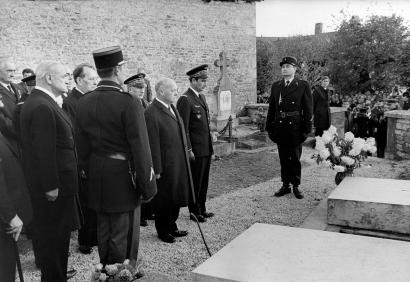 Companions of the Liberation at General de Gaulle's funeral in Colombey-les-deux-Eglises on 12 November 1970.
Companions of the Liberation at General de Gaulle's funeral in Colombey-les-deux-Eglises on 12 November 1970.
He retreated to Colombey-les-Deux-Eglises, refrained from taking any public stances, and continued writing his memoirs. Mémoires de Guerre (“War Memoirs”) had begun to be published in 1954. Only the first volume of Mémoires d'espoir (“Memoirs of Hope”) had been completed when Charles de Gaulle died on 9 November 1970. While an official ceremony was being held in Notre-Dame Cathedral in Paris with state authorities and foreign dignitaries, he was buried in Colombey cemetery in the presence of his family, some Companions of the Liberation and inhabitants of his village.
Chancellors of the Order of Liberation
After General de Gaulle, the highest-ranking person in the Order of Liberation is the Chancellor. Ensuring the smooth running of the institution and discipline in the Order he administers, he is the state's 16th highest-ranking person in the order of precedence.
He attends numerous commemorative (inaugurations) and scientific (symposia and congresses) events. One of the roles of the Chancellor of the Order of Liberation is to preside over ceremonies commemorating the Appeal of 18 June 1940 at Mont-Valérien in Suresnes.
Necessarily a Companion of the Liberation, he is chosen by the Council of the Order. His nomination is then officialised by decree.
The chancellor – appointed for a renewable term of four years (since the Decree of 13 April 1962) – also looks after the Museum of the Order of Liberation, as well as the administration of the Resistance Medal.
From January 1941 to November 2012, eight people held the position:
- Admiral Georges Thierry d'Argenlieu (1941-1958)
- General François Ingold (1958-1962)
- Mr Claude Hettier de Boislambert (1962-1978)
- Army General (reserve) Jean Simon, (1978-2002)
- Army General (reserve) Alain de Boissieu (2002-2006)
- Mr Pierre Messmer (2006-2007)
- Professor François Jacob (2007-2011)
- Mr Fred Moore (2011-2012)
On 16 November 2012, the position of Chancellor of the Order of Liberation was replaced by that of “National Delegate”. The current National Delegate is General (reserve) Christian Baptiste. The honorary chancellor is Daniel Cordier.



